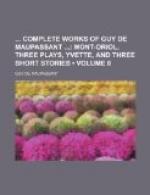“Well!” Ernest asked boldly, “and what about the Marquis?” “He left very early,” Sonia replied. “A queer sort of marquis, I must say!” Ernest observed contemptuously, and growing bolder. “Why, I should like to know?” Sonia replied, drawing herself up. “The man has his own habits, I suppose!” “Do you know, Madame,” Sabina observed, “that he came back half an hour after he left?” “Ah!” Sonia said, getting up and walking about the room. “He came back? What did he want, I wonder?” “He did not say, Madame. He merely went upstairs to see you. He was dressed in his old clothes again.”
And suddenly Sonia uttered a loud cry, and clapped her hands, and the seven came round to see what had caused her emotion. “Look here! Just look here!” she cried. “Do look on the mantel-piece! It is really charming! Do look!”
And with a smiling, and yet somewhat melancholy expression in her eyes, with a tender look which they could not understand, she showed them a small bunch of wild flowers, by the side of a heap of half-pennies. Mechanically she took them up and counted them, and then began to cry.
There were forty-seven of them.
THE BED
On a hot afternoon during last summer, the large auction rooms seemed asleep, and the auctioneers were knocking down the various lots in a listless manner. In a back room, on the first floor, two or three lots of old silk, ecclesiastical vestments, were lying in a corner.
They were copes for solemn occasions, and graceful chasubles on which embroidered flowers surrounded symbolic letters on a yellowish ground, which had become cream-colored, although it had originally been white. Some second-hand dealers were there, two or three men with dirty beards, and a fat woman with a big stomach, one of those women who deal in second-hand finery, and who also manage illicit love affairs, who are brokers in old and young human flesh, just as much as they are in new and old clothes.
Presently a beautiful Louis XV. chasuble was put up for sale, which was as pretty as the dress of a marchioness of that period; it had retained all its colors, and was embroidered with lilies of the valley round the cross, and long blue iris, which came up to the foot of the sacred emblem, and wreaths of roses in the corners. When I had bought it, I noticed that there was a faint scent about it, as if it were permeated with the remains of incense, or rather, as if it were still pervaded by those delicate, sweet scents of by-gone years, which seemed to be only the memory of perfumes, the soul of evaporated essences.
When I got it home, I wished to have a small chair of the same period covered with it; and as I was handling it in order to take the necessary measures, I felt some paper beneath my fingers, and when I cut the lining, some letters fell at my feet. They were yellow with age, and the faint ink was the color of rust, and outside the sheet, which was folded in the fashion of years long past, it was addressed in a delicate hand: To Monsieur l’Abbe d’Argence




